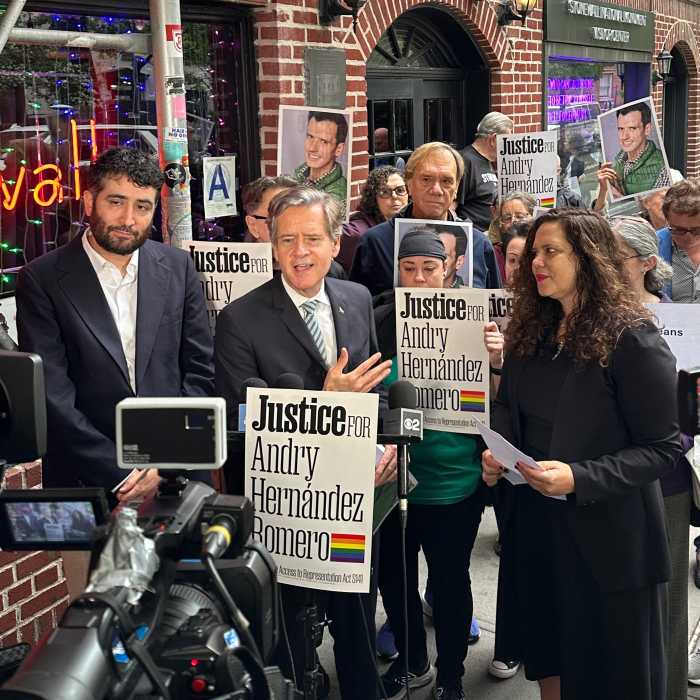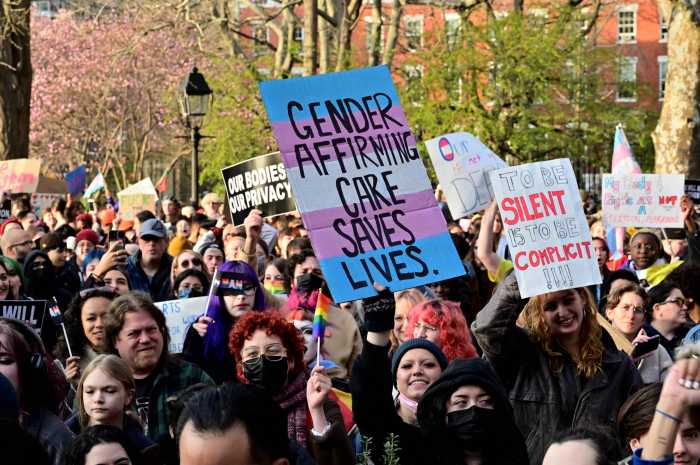Human Rights Watch acknowledges attacks on Brit activist Peter Tatchell “inappropriate, disparaging, inaccurate”
Human Rights Watch (HRW), the world’s largest and most prestigious human rights organization, has made a stunning public apology to Britain’s iconic gay and human rights activist, Peter Tatchell, for attacks heaped on him by HRW’s Scott Long, who directs the organization’s LGBT program.
Long made numerous public statements about Tatchell that were “inappropriate… disparaging… inaccurate… condemnatory… intemperate personal attacks,” HRW acknowledged.
Long’s antagonism toward Tatchell — and others — began in an explosive controversy over the Iranian government’s 2005 execution of two teenage boys in Mashad; authorities there said the two were guilty of the rape of a younger boy, while sources in that country told advocates and journalists that the two were instead killed because of consensual gay sexual conduct.
In the June 30 apology to Tatchell, head of the militant British gay rights group OutRage!, HRW’s executive director, Kenneth Roth, acknowledging the falsehoods circulated by Long, said, “We recognize that personal attacks have no place in the human rights movement.”
HRW, which has its headquarters in New York, has an annual budget of some $45 million and a staff of 275 operating in 40 countries.
HRW’s apology to Tatchell appears to be unprecedented. The group’s deputy program director, Joe Saunders, asked by Gay City News if it had ever issued a similar apology to anyone else, said he could not recall one, nor did a Google search reveal any.
Earlier this year, Tatchell was forced by head injuries he has received in beatings during his human rights work to withdraw as the Green Party’s candidate for Parliament from a constituency in the university town of Oxford, where he is quite popular, and where the party won a plurality in the previous election. In elections in May, the Greens made their entry into Parliament, and Tatchell had a serious chance of being elected.
The British daily The Guardian, in reporting Tatchell’s withdrawal from the contest under the headline “How Constant Beatings Have Caught Up With Campaigner Peter Tatchell,” noted he had survived “more than 300 physical attacks, two stabbing attempts, a live bullet posted through his door, and a succession of vicious beatings that have left him mildly brain-damaged.”
Tatchell has put himself in harm’s way numerous times in his human rights efforts — from a 2001 effort to make a citizen’s arrest of Zimbabwe’s Robert Mugabe in Brussels, at which time he was beaten unconscious by the dictator’s bodyguards, to a 2007 appearance in Moscow in solidarity with gay rights advocates there, when he was assaulted by neo-Nazi goons who acted in collusion with police.
Responding to the HRW statement, Tatchell said, “I thank Kenneth Roth and HRW for their gracious and fulsome apology. Their readiness to acknowledge the wrong done and say sorry is commendable. My appreciation also to Scott Long for conceding his false allegations and apologizing. It can’t have been easy for him. He has shown dignity and humility. I appreciate that.”
The British activist added, “I accept the apologies. It is time to forgive and move on. For me, this closes the matter. The attacks on me are in the past. I look forward to working with HRW and Scott Long in the future.”
The HRW statement included an admission from Long that he’d made false statements about Tatchell.
“Although we have our different viewpoints, I respect Peter Tatchell’s contribution to human rights and apologize for any condemnatory and intemperate allegations made in haste and for any inaccurate statements made in my personal capacity,” Long said.
The HRW apology apparently puts an end to Long’s five-year campaign of attacks on Tatchell.
The HRW statement says, “Following Mr. Long’s apology and subsequent discussions, Human Rights Watch is pleased to announce that both Mr. Long and Mr. Tatchell agree that the movement to protect human rights, including the rights of LGBT persons, is best served when activists focus their criticism on those who abuse rights rather than those who seek to defend those rights.”
Speaking of Long’s attacks, Tatchell said, “I defend the right of people to criticize me. But Mr. Long’s attacks went beyond criticism. He made false allegations, which misrepresented my human rights campaigns. It is these untrue claims that are the focus of my objections.”
Tatchell focused particular attention on what he terms “a highly libelous and defamatory essay written” by Long in the journal Contemporary Politics, which is published by Routledge. That essay, the 58-year-old British activist noted, “made inaccurate allegations. It grossly misrepresented and denigrated my campaigns in defense of gay people persecuted by Iran and in opposition to Islamist fundamentalism.
“I acted in good faith when I opposed the execution of Iranians accused of homosexuality and when I campaigned against fundamentalist Islam in Britain and worldwide. Contrary to Mr Long’s claims, I never accused the 13-year-old victim of an alleged rape in Iran of ‘wanting the rape.’ Nor am I guilty of ‘belittling violent sexual assault, and blaming the victim.’”
Long’s article in Contemporary Politics also accused Tatchell of “going after” British Muslims and adopting a “bullying tone” toward the Muslim community in Britain.
“This,” Tatchell said, “is also untrue. I have always made a clear distinction between Muslim people in general and the Islamist extremists who oppose human rights, including the human rights of fellow Muslims. Indeed, I have often defended Muslim communities, in Britain and worldwide, against prejudice and persecution. I will continue to do so.”
According to UK Gay News editor Andy Harley, “When Tatchell was seriously assaulted during Moscow Gay Pride in 2007, the first group who condemned the attack, and expressed support and good wishes for a speedy recovery, were exiled Ahwazi Arabs, a persecuted ethnic minority in Iran. They described Peter Tatchell as ‘an icon in human rights.’ This speaks volumes, coming from a Muslim group that has been supported by Peter.”
When Pervez Musharraf, then Pakistan’s dictator, visited London in 2008, Tatchell used his body to block his limousine while holding a placard reading, “Stop Pakistan’s Massacre of Baluch People.” The oppressed ethnic minority of more than six million who inhabit the Baluchistan region of Pakistan are Sunni Muslims. (See this reporter’s January 31, 2008 article, “London’s OutRage! Leader Blocks Pakistani Strongman’s Limo.” )
Tatchell provided Gay City News with a copy of the detailed, heavily documented dossier he compiled convincingly refuting, one by one, Long’s many false allegations against him. It was upon consideration of this dossier, HRW’s Saunders told this reporter, that HRW was convinced to issue its apology to Tatchell.
The dossier provides links from the British press and from his own website that support his assertion that “much of my human rights work involves supporting and publicising the plight of victimised Muslim prisoners and asylum seekers — gay and straight… And I have been prominently involved in campaigns in support of the rights of persecuted Sunni Muslims in Iran, against Russian war crimes in Muslim Chechnya, and for the rights of the Palestinian people.”
But for some, HRW’s apology to Tatchell raises more questions than it answers.
Nikolai Alexeyev, the lead organizer of the Gay Pride events repeatedly banned in Moscow and founder of GayRussia.ru, is among those who have been objects of Long’s attacks. An attorney, Alexeyev — who has brought 168 lawsuits against Russia for outlawing gay demonstrations and for officially encouraging homophobia — responded via email to a Gay City News request for comment, saying, “The problem of HRW’s LGBT programs is that it turns around the personality of Scott. I’d be happy to work with HRW on monitoring in Russia, especially because my group is the most experienced in Europe in dealing with LGBT cases at the European Court of Human Rights — but not as long as the leadership is what it is. I think Peter is very kind to forgive all this dirt that was put on him. This can only be to his credit.”
Others who have faced the ire of Long include French professor Louis-Georges Tin, founder of the International Day Against Homophobia and father of the UN Declaration in support of the decriminalization of homosexuality, now signed by 66 governments, including the Obama administration; Arsham Parsi, founder of the Persian Gay and Lesbian Organization while still in Iran and, once he fled to asylum in Canada with the Iranian police on his heels, of the Iranian Railroad for Queer Refugees; and Ali Hili, the Iraqi exile in London who founded the group Iraqi LGBT.
HRW’s Saunders told Gay City News that, in its inquiry into Long, his attacks on these unpaid activists were not considered.
Long’s directorship of HRW’s LGBT program does not seem to be in jeopardy, Saunders telling this reporter that he and his colleagues considered the apology to Tatchell “a small matter.” Indeed, the HRW apology appears nowhere on the organization's website — although a March 30, 2008 release that makes the Long case against Tatchell still does.
Full disclosure: Long’s attacks have also focused on this newspaper and this reporter. In a statement after the HRW apology, Gay City News editor-in-chief Paul Schindler said, “Our contributing editor Doug Ireland, a journalist for more than 30 years who has written on international affairs and human rights for some of the world’s top publications, has been among Long’s chief targets.
“While professing ‘deep respect’ for Ireland’s work and even acknowledging that numerous of his Gay City News contributions uncovered stories of ‘Iranian survivors of torture and abuse which are authentic and compelling,’ Long, in Contemporary Politics and elsewhere, variously accused him of being ‘uncritical’ in his reliance on sources, of ignoring the plight of childhood victims of rape, and of putting an Iranian human rights attorney’s life in danger.
“Despite Ireland’s reliance on the best available sources on Iranian culture and sexuality — including University of California professor Janet Afary, an exiled Iranian who long headed the International Society of Iranian Scholars and wrote ‘Sexual Politics in Modern Iran’ (Cambridge University Press) — Long lumped Ireland in with a crowd he charged was simply ‘imputing a Westernized “gay” identity’ on people from other cultures. Long also charged — presumably with a straight face, despite Ireland’s well-established progressive bona fides — that he ‘suggest[ed] Western intervention was essential: whether missiles or mass emails was left for later.’ Ireland, in fact, has written numerous articles opposing any military adventure in Iran, whether by the US or by Israel.
“Long also distorted the work of others in Gay City News. In Contemporary Politics, he quoted associate editor Duncan Osborne writing that ‘rape by men of men is comparatively rare,’ an example, he suggested, of ‘the spectacle of gay rights activists belittling violent sexual assault, and blaming the victim.’ That assertion ignores the context of Osborne’s piece, which weighed the relative plausibility that the two young men executed in Mashad, Iran, in 2005 were guilty of rape, as the government asserted, or of consensual gay conduct. Osborne also asked rhetorically why the Iranian regime, generally immune to world opinion, would even bother to trump up rape charges to justify their deadly actions — clear evidence he was looking at both sides of the question.
“Osborne, in fact, acting as editor for that same issue of Gay City News, gave Long space to publish his views on the debate over gays in Iran. Others who shared Long’s posture in that debate were also invited into the newspaper’s pages.
“The most ironic thing about Long’s diatribes against Ireland comes in the opening to his Contemporary Politics article, where he attacks activists making use of the 2007 execution of Makwan Moloudzadeh — a 21-year-old convicted for the rape, at age 13, of other boys his age, despite recanting by his accusers — to make the case that gays are being persecuted in Iran. ‘Makwan,’ Long wrote, ‘was manna’ for those activists, even though ‘Makwan was not gay.’ Long offered the same critique shortly after Ireland, in Gay City News, wrote the first detailed story about the execution, based on interviews with the young man’s attorney and the only journalist in Iran to have covered the case extensively — and whose own newspaper would not print her story. Had Long read Ireland’s story, he would be aware that he was very clear that it is not known whether any sex ever took place or if Makwan was gay. Long, instead, merely reflexively regurgitated his own repeated rhetoric.
“Long’s apology to Tatchell would make a welcome clearing of the air if extended to his repeated false discrediting of what has been significant and worthy human rights reporting in the pages of Gay City News.”
Long’s change of tune about Tatchell tracks the revisionist view of the human rights activist in the British press.
“Is Peter Tatchell The Bravest Man in Britain?” was the headline on the profile of Tatchell that the Daily Mail, Britain’s third-largest newspaper, ran on Christmas Day last year after his withdrawal from the parliamentary race.
“Police intelligence revealed that Tatchell was a prime assassination objective because of his persistent campaign against a group of reggae singers whose lyrics glorify violence and incite the killing of homosexuals,” the newspaper wrote. “Tatchell had thwarted a string of concerts — at significant cost to the performers.”
This is the same Daily Mail that, less than two decades ago — when homophobia was much more rampant on Fleet Street — denounced Tatchell as “loony,” “scabrous,” “repellent,” “repulsive,” and a “homosexual terrorist” for his outing of ten Anglican bishops in 1994 because of the Church of England’s homophobia, his interruption of the archbishop of Canterbury’s Easter Service four years later, and his distribution of condoms during High Mass at Westminster Roman Catholic Cathedral in 1993.
Now, however, the Daily Mail calls Tatchell “heroic… an example to us all,” while the Sunday Telegraph hails him as “a civil rights campaigner we can all applaud,” and the Sunday Times of London applauds him as “a national hero.”
The Daily Mail noted that despite his national celebrity, Tatchell lives in poverty: “He subsists on a tiny stipend of around £8,000 a year — the income comes from journalism and personal appearances — and lives in the same cramped South-East London council flat [low-income public housing] that has been his home for 30 years. When it was targeted by arsonists, he refused to move, although flaming rags were pushed through his letterbox and lavatory window. His response, instead, was to become more intransigent: ‘Friends urged me to leave, but I was determined to stand my ground. It might seem pig-headed and stupid, but I refused to let anyone force me out.’”
The physically fearless activist confronted Zimbabwe’s Mugabe in 2001, citing the 1984 UN Convention against Torture after the homophobic strongman ordered the torture of two journalists and inflicted similar treatment on countless political opponents. The beating by Mugabe’s thugs left Tatchell paralyzed down his left side for several days and with permanent damage in one eye. Yet Tatchell persisted, attempting another citizen’s arrest of Mugabe in Paris in 2003, at which time he instead was arrested.
In Moscow in 2007, Tatchell, joining Alexeyev and his comrades in their attempt to hold a banned Moscow Gay Pride demonstration, was beaten in the head as new-Nazi youth attacked gay marchers with the approval of local police officials. (See this reporter’s May 31, 2007 article, “The Agony of Moscow Pride.”)
The beating at Moscow Gay Pride was one too many for Tatchell, who has never really recovered and has suffered ever since from permanent severe symptoms of concussion, including difficulties in memory, concentration, vision, balance, and coordination.
Doug Ireland can be reached through his blog, DIRELAND, at http://direland.typepad.com/.


































